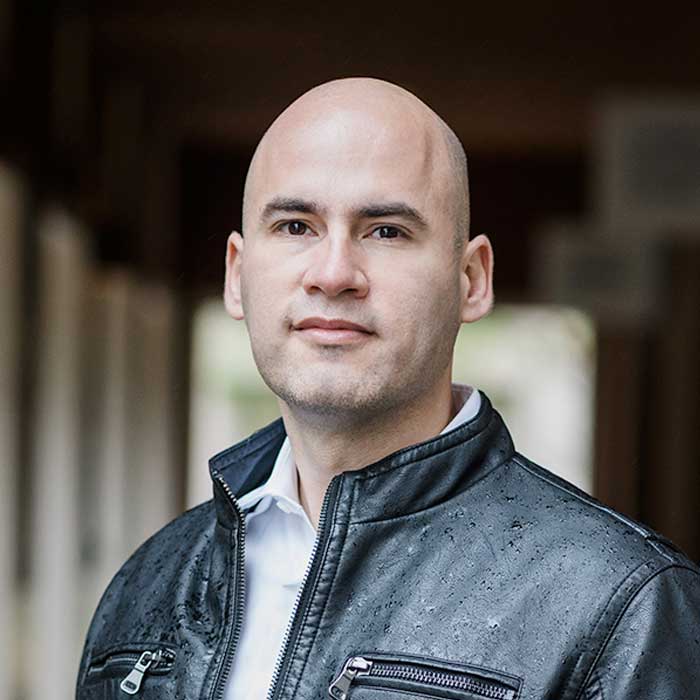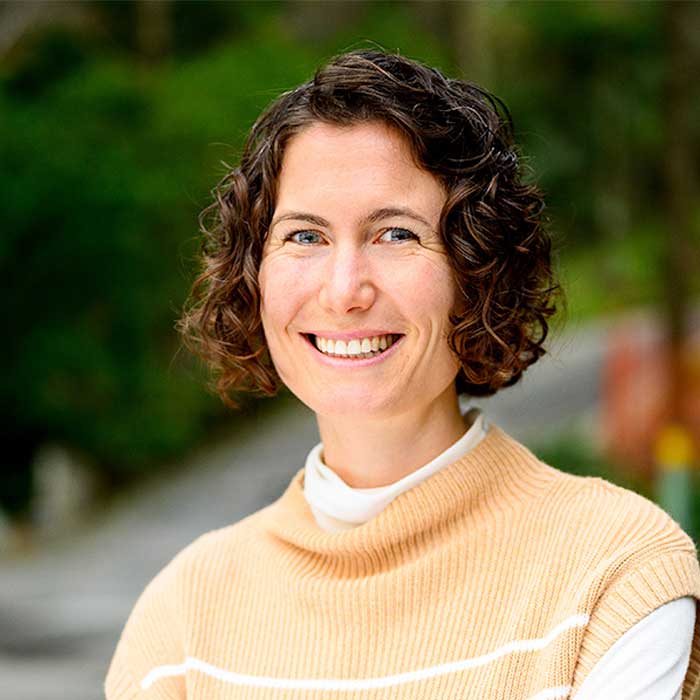Two UCSF Faculty Named to New Group of HHMI Scholars
Gonzalez and Phillips Tapped for Leadership Potential to Establish Diverse and Inclusive Labs
Two rising UCSF faculty members – Walter G. Gonzalez, PhD, in the Department of Physiology, and Angela Phillips, PhD, in the Department of Microbiology and Immunology – are among 31 members of the inaugural class of the new Howard Hughes Medical Institute (HHMI) Freeman Hrabowski Scholars.

Walter G. Gonzalez, PhD
Department of Physiology

Angela Phillips, PhD
Department of Microbiology and Immunology
Chosen for their “potential to become leaders in their research fields and to create diverse and inclusive lab environments in which everyone can thrive,” each scholar will be appointed to a five-year term, which can be renewed for a second five-year term, with support up to $8.6 million.
“Angela and Walter came to UCSF having already made an impressive impact on their research fields, and it’s wonderful that HHMI sees their great potential to make more discoveries and lift up future generations of young scientists,” said David Morgan, PhD, vice dean for research in the UCSF School of Medicine. “I’m thrilled that the future of our discovery science community is in such good hands.”
The Freeman Hrabowski Scholars Program is named after a prominent researcher who dedicated much of his career to increasing the number of scientists, engineers and physicians from underrepresented backgrounds. It is aimed at early-career faculty members who face a daunting task in their first few years to fund and establish their laboratories.
“The Freeman Hrabowski Scholars program reflects HHMI’s continued commitment to supporting people, not projects,” HHMI President Erin O’Shea said. “We aim to provide scholars with the resources they need to pursue scientific breakthroughs and empower others to ask critical research questions. In this way, our scholars are well positioned to make an indelible impact on the future of science.”
Learning From Our ‘Hmm’s and ‘Uh’s
Gonzalez studies the mistakes that birds make when courting each other with elaborate songs. He uses measurements of electrical activity across thousands of neurons in the brain to study how these mistakes, akin to the “hmm”s and “uh”s that interrupt human speech, might actually improve singing or talking.
Babies know how to make such filler sounds without learning from their parents, and Gonzalez believes that they might be crucial for fluid vocalizations in animals and humans, helping the brain soothe itself in the midst of ongoing communication.
Gonzalez grew up in Argentina and Paraguay and his move to Miami as a teenager sparked a passion for studying the physical systems that drive behavior.
“When I was a kid I was really interested in robots and I had my own room filled with machinery that I harvested from trash,” he said. “But when we moved to the United States, I didn’t have anything. All I could do was think. And that’s what guided my interest in physics and math. I had to think abstractly about the things that interested me.”
Despite his lack of English or higher education role models in his family, Gonzalez pounced on every opportunity to learn. He paid for his SAT test with money saved from years working as a dishwasher and line cook, and capitalized on a state scholarship for college when his family’s green cards arrived.
... Now I can open doors to people that might not have had the access to pursue their science.
As a physics major at Florida International University, Gonzalez fell in love with protein biophysics or, as he puts it, the study of “miniature robots,” and with the encouragement of his faculty mentor, he decided to pursue a PhD in chemistry. Gonzalez then completed a postdoctoral fellowship at California Institute of Technology with neuroscientist Carlos Lois, where his experience studying the interactions between atoms became useful for studying interactions between neurons.
With the support of HHMI, Gonzalez looks forward to attracting a diverse team of students, postdocs and technicians to continue to blend insights across fields to understand behavior. The team will help Gonzalez pursue his scientific goals, and he intends to reciprocate the gesture.
“I am a strong believer that genius or talent is a spontaneous process, you never know where talent might be found,” Gonzalez said. “I experienced what it’s like to go to a very large, minority-serving, public institution, and now I can open doors to people that might not have had the access to pursue their science.”
The Molecular Arms Race Between Humans and Viruses
Angela Phillips studies the interplay between immune and viral proteins, using methods that allow her to test hundreds to thousands of small changes to proteins and observe their impact on protein function.
“There’s substantial interest in understanding how viruses are going to evolve in the future and how our immune system responds to them,” Phillips said. “We’re applying methods and concepts from protein biophysics to understand evolution within the host-virus arms race.”
Phillips can trace her passion for science to a high school chemistry class, where she learned how HIV therapies manage to thwart the HIV virus. “I found it super exciting, being able to apply fundamental knowledge to solve a human health problem,” she said.
Phillips’ path into research wasn’t straightforward. She was initially appointed a cadet at the U.S. Air Force Academy in Colorado, intending to be a pilot and engineer, but transferred to the University of Florida to study chemistry. As the first in her family to graduate from college, let alone study science, she let her interests guide her, and ended up pursuing her PhD in biochemistry at MIT.
Bringing diverse scientists together with fellowships or other communities is really helpful in ensuring that those talented scientists don’t leave the academic path.
Like Gonzalez, Phillips pivoted into a new field for her postdoc, joining Michael Desai’s evolutionary biology group at Harvard to apply her expertise toward a new and enthralling application: how human proteins stay one step ahead of viral proteins. As a senior postdoctoral scholar, she had the opportunity to mentor several of the lab’s graduate students, which she said helped her to realize that she might enjoy running her own research group.
At UCSF, Phillips’ broad range of experience continues to fuel her science, marrying virology and immunology with tools from genetic engineering and biophysics, and she’s found the campus to be a good fit, from supportive colleagues to students who, like Phillips herself, are excited to combine fields, build new tools and share their enthusiasm for science.
The Freeman Hrabowski Scholar funding will enable Phillips to spend more time with her students and cultivate an inclusive laboratory that’s able to tackle “the most exciting science, immediately,” she said.
“One of my goals, when I talk with young trainees, is to communicate my story,” Phillips said. “I didn’t have it all figured out, and I didn’t know everything. Not every single part of your journey has to work out and I think that’s really important for not discouraging people from continuing on this path.”
Phillips also looks forward to being a part of the HHMI Freeman Hrabowski Scholar community, having benefited from the community of HHMI Hanna Gray Fellows, which supported her during her postdoc.
“Being a part of a diverse community enables you to see that a science career can work for lots of different people, in a way that can be impossible to find otherwise,” Phillips said. “Bringing diverse scientists together with fellowships or other communities is really helpful in ensuring that those talented scientists don’t leave the academic path.”